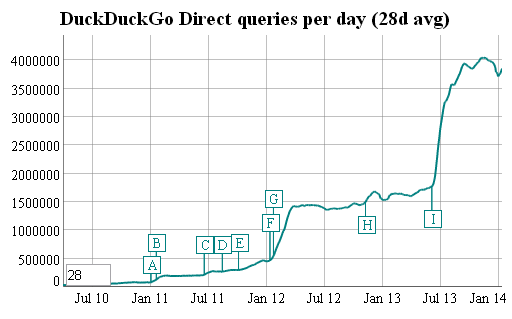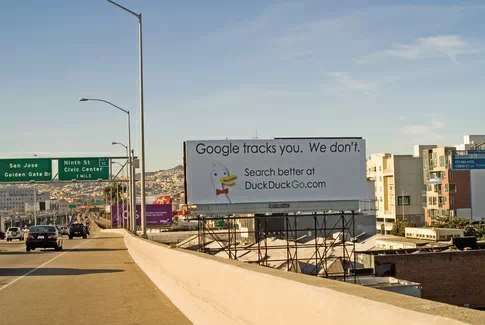The friendly face of DuckDuckGo’s adorable mascot has made an appearance on more than a few news sites this month. Having had a successful 2013, this year promises to be even better as they celebrated their biggest day so far on January 14th serving over 4.6 million (4,633,550 to be exact) search queries.
Not yet a household name, DuckDuckGo has been around since 2008 and has earned its underground reputation as a secure alternative to Google and other leading search engines. Boasting an incredible level of transparency, unlike other search engines, DuckDuckGo does not track cookies or collect or share personal information (including IP addresses).
Having first heard of this search engine back in 2011 when they first began to catch media attention, watching their development since has truly been fascinating. DuckDuckGo threw themselves onto the scene with the launch of their DontTrack.Us website (an illustrated guide on how your online activity can be tracked by using Google), then DontBubble.Us following the success of that (an illustrated guide to search engines’ so-called “filter bubbles”). Their billboard stunt in San Francisco claiming “Google tracks you. We don’t.” in huge letters gained them further media attention and that, combined with an investment injection and Times naming them one of the top 50 websites that year, called for a fresher redesign of their website in January 2012.
Shortly after their redesign, Google revealed a change to their privacy policy to integrate user information across all of its services (including Gmail and YouTube) much to the dismay of many. A change which seemed to coincide with DuckDuckGo’s first real growth spurt and within a couple of months, they had doubled their traffic.

DuckDuckGo’s Recent Growth in Popularity
Their traffic remained steady throughout the next year, not dropping but not particularly impressive either. It was only in June 2013, when whistleblower Edward Snowden released sensitive NSA documents revealing mass internet surveillance, that DuckDuckGo saw a huge spike in their search engine usage, doubling within just two weeks. These revelations instilled worldwide concern over the personal data that governments have direct access to. Reports state that the NSA and FBI tapped directly into the servers of major internet services such as Google, Microsoft, Apple, Facebook, Yahoo, Skype, YouTube and AOL. When other search engines were being pressured from governments to hand over data, DuckDuckGo had only this to say: “We had zero inquiries and the reason for that is because we don’t store any data. So if they come to us — which they know because it’s in our privacy policy — we have nothing to hand over, it’s all anonymous data”.
DuckDuckGo stands for online privacy and for the option to use the internet anonymously should we want to. Logically it makes sense for DuckDuckGo to be the default search engine for the Tor-enabled browser bundle but in September 2013, Gnome desktop environments also defaulted their search engine from Google to DuckDuckGo which generated even more awareness within the Linux communities. Though the impact that had on increased usage could be questioned as the default search engine on Windows is Bing and they still only compose a fraction of the search market share in comparison to Google (a mere 18.2% in comparison to Google’s 67.3% as of December 2013).
DuckDuckGo saw one billion searches in 2013. To put that into context, that was what Google was generating before the turn of the millennium. According to comScore reports, in 2013 Google served an average of six billion searches per day. When compared to DuckDuckGo’s tiny one billion in one year, it seems ridiculous to even consider them to be a serious competitor against Google. However it’s important to note the impression that DuckDuckGo is making on the search industry isn’t about the numbers. They are setting a standard and those who notice (whether they go on to replace Google with DuckDuckGo’s search engine or not) start expecting more from major search engines. And people are certainly noticing.
Escaping the Filter Bubble
By default, DuckDuckGo doesn’t provide personalised search results – everyone is served the same thing. Whether that’s a positive or negative thing really depends on the type of searcher you are and your own preferences. With Bing and Google, the search results you are presented with are ones that you are more likely to agree with or click on according to your search and click history. To many, this may seem really convenient as you’re more likely going to find what you’re looking for quicker or generally just be happier with your results, but it may also demote more relevant or opposing results (that you might not necessarily like). Eli Pariser, internet activist and chief executive of Upworthy who first coined the term “filter bubble”, is quoted to have said: “A world constructed from the familiar is a world in which there’s nothing to learn … (since there is) invisible autopropaganda, indoctrinating us with our own ideas”. Though by default DuckDuckGo doesn’t filter-bubble their users, filters (such as geotargeting) can be enabled by the user in the search engine settings should they so choose. They also offer a variety of different style changes in the settings to aid in the seamless transition from usual preferred search engines and accommodate new users.
Jumping on the Anti-Google Bandwagon
DuckDuckGo isn’t the only one to take advantage of Google privacy concerns recently. Microsoft took advantage of 2013’s heightened privacy fears by re-launching the Scroogled campaign, pulling no punches this time with an array of anti-Google merchandise for sale online. Unfortunately for Microsoft, a number of Google employees responded to the campaign with amusement and claimed to have purchased Scroogled merchandise themselves, others deeming the move from Microsoft to be hypocritical and desperate. All profits from the sale of Scroogled merchandise is donated to charity.


The Future of DuckDuckGo
With The Guardian claiming “the worst yet to come”, having only published one percent of the documents in November 2013, I predict that these are still early days for DuckDuckGo. As they gain more attention and become more widely used, I think that there will be many more that will start using them as an alternative to the search engine giants. However they don’t have a chance at overtaking Google when it comes to search and they know that. Some may complain about Google’s privacy policies and even the advertising dominating Google’s SERPs, but wouldn’t dare dream of making the switch. For one thing, what would the majority of us do without the added bells and whistles that we have come to expect from Google’s SERPs? We live in a world where when Google’s services suffer from a five minute blackout, as they did in August 2013, global web traffic drops a massive 40%, thus further proving Google’s stranglehold on the internet. Though far from overthrowing the mighty Google from its throne, DuckDuckGo remains a respectable underdog that appeals to a niche market and targets it well.
Billboard image provided by wired.com
Scroogled images provided by marketingland.com



